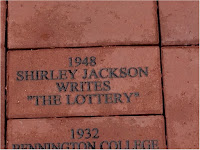
I'm working on a big TMT post on the wonders of Tweetdeck. However, Blogger won't let me use my screenshots, which I really want for illustration. So I need some more
time to work that out with my computer guy, who is
not going to be happy about this. I also need to work on next month's
Connecticut Children's Lit Calendar.
Most of all, I am rushing/struggling to finish the mummy draft before Labor Day Weekend because I'm leaving for a trip the next day. I have a specific unit of time in which to do this, this summer, which is ending soon. When I get back from vacation, a new unit of time will start, one in which I want to do some other things related to the mummy project, but
not the first draft.
Since I am experiencing the end of a unit of time (something I always find exciting, even if there is pressure) and coming up on the beginning of another (exciting, exciting, exciting.), I've decided that rerunning a blog post from
June 19, 2012, one on beginnings and endings, will make the best use of my time today. It also introduces the idea of
situational time management. Indeed, the end of this summer unit of time I'm working with means that I am dealing with a specific situation--finishing up--totally different from the situation I'll be dealing with when I'm back at work in October. Different situations require different time management from us.
The Significance Of Beginnings And Endings
When I say that beginnings and endings are significant, I'm talking
about the beginnings and endings of units of time, not manuscripts.
The
beginning of a new calendar year (I've written many times here, I'm
sure, about how much I love the month of January), a new school year,
and summer break...fun times, huh? We tend to get excited about our
plans for "new" blocks of time. Oh, what we're going to do this
Christmas season!
NaNoWriMo!
May Days! If we can perceive some upcoming time as something new, as something different, a
change,
it's far easier to believe that we can make a change in how we're going
to behave in that new chunk of time than it is to believe we can just
change what we're doing now in this ho-hum unit of time we've been
living in.
If we think about
the unit system I
wrote about back in February and the research that suggests that people
are productive for the first 45-minutes that they work, there may be
some logic to our love of new beginnings. Experience has taught us that
we're more productive when we start something new, and we like feeling
productive. We like the surge of starting something new. I swear, we
once got new living room furniture, and just that change led me to start
a new plan to keep everyone from eating in the living room. That
probably didn't even last 45-minutes, but I remember the rush I felt not
because I had a new couch and two new chairs
all at the same time, but because the new furniture changed something and I was going to do something different because of it.
The
end of a unit of time is a different story, particularly if things
haven't gone well during the time period that is drawing to a close.
Take last week for me, for instance. I ended up taking one elder to a
doctor's appointment on Monday, wasting a lot of time Tuesday reading a
book (on my Kindle!), visiting an elder on Wednesday, visiting the first
elder again on Thursday (as well as doing life maintenance work while I
was out of the house). It got to be mid-day Friday, and I thought, Ah,
the week was wasted, anyway, I might as well surf the 'Net. And start
again next week when a new unit of time will begin.
In this situation, you can see the
parallels between applying self-discipline to work and applying self-discipline to "problems" such as eating, smoking, etc. Oh,
this day of dieting is ruined, anyway, because I ate a second cupcake. I
might as well eat a couple more and start again tomorrow. How much time
is wasted at the end of a bad work unit because we're too disappointed
in what we've accomplished to continue? And how to make better use of
that time?
Well, yes, we could suck it up and apply
some self-discipline, but if you aren't aware that I'm low on that, you
haven't been reading this blog regularly. I wanted to come up with
another way to make better use of those bad ending hours. While driving
home from my taekwondo class last night, I did. (This is an example of a
breakout experience,
by the way. I'd been thinking about this situation for three days, and
an idea for a solution came to me after an hour of practicing joint
locks and knife defense.)
Doing absolutely anything
work-related during those lost hours at the end of a unit of time would
be better than just blowing them off because things didn't turn out the
way we planned in the days leading up to them. Anything. So we can
keep fallback work to do then. For writers, this will not be difficult.
We have piles of promotional work, research, projects that we've started
and not finished that we could shift to when we realize that we're
blowing off time. Filing. Checking up on the status of submissions. A
table covered with three inches of books and paper in the office. (Oh?
That's just me?) Getting some of this stuff done will positive in and of
itself, but getting it done will also free up time in the future for
other kinds of work. Win-win, as they say.
How am
I
going to do those things when I've just mentioned that I'm weak on
self-discipline? The plan (And I love a plan! It's as if I'm starting a
new unit of time!) is to
plan for those situations. The plan is to have fallback tasks ready for when the first task doesn't pan out.
I
am going to call this
Situational Time Management. I will write more
about it next week, since I just came up with the idea as I was getting
off the stationary bike less than two hours ago. Any idea benefits from
thought.
 The school year begins, and we have a little more happening.
The school year begins, and we have a little more happening.
 Thurs., Sept. 24, R.L. Stine and Marc Brown, First Congregational Church (sponsored by R. J. Julia), Madison 5:00 PM Ticketed event
Thurs., Sept. 24, R.L. Stine and Marc Brown, First Congregational Church (sponsored by R. J. Julia), Madison 5:00 PM Ticketed event





















